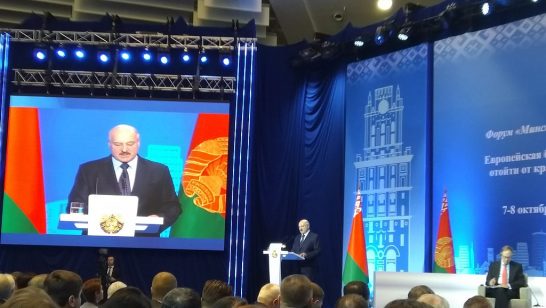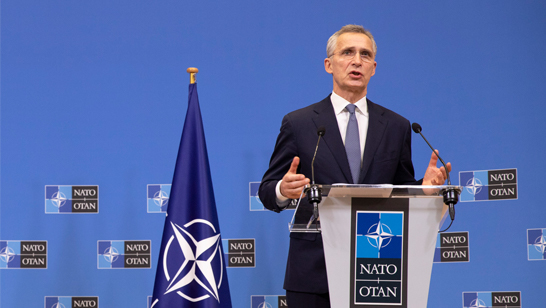
When NATO agreed last year upon convening a summit-meeting in Wales in early autumn 2014, no one could imagine how much attention such a gathering of the heads of states and governments would receive. After Russia’s aggression against Ukraine, Putin’s illegal annexation of Crimea and the shoot-down of a civil aircraft (arguably by pro-Russian rebels) public awareness grew significantly and the question of “whither NATO” is back on the agenda. What will the NATO leaders decide in Wales to cope with the neo-expansionist tendencies in Russia and what will the Alliance’s future course look like? Will NATO go back to its founding mission of securing the European continent or will it preserve its 360° perspective as a global security actor?
With respect to the Ukraine crisis, the outcome of the summit appears to be fairly predictable. Probably to the surprise of Mr. Putin, NATO has proven remarkably united, despite its limited power to respond to Russia’s aggression against a non-NATO member. Of course, allies differ on the intensity of using military countermeasures or economic sanctions against Moscow, depending on their geographical proximity to Russia or their current economic situation. Still, all 28 members are aware that in order to preserve NATO’s territorial integrity and political cohesion the Alliance has to act by sending a double message.To Russia: a signal of resolve and decisiveness and to the allies in the East: a sign of a credible defense commitment. To convey this dual message NATO will agree on enhancing its rapid reaction capabilities (NATO Response Force, NRF), on reassessing its contingency plans and on bolstering its military presence in Eastern Europe through more exercises and the rotation of forces. Many allies hesitate to permanently deploy NATO forces in the East simply because a meaningful military presence in Poland or in the Baltics is an extremely costly effort. Here, important steps are likely to happen on a bilateral basis – President Obama has announced to spend USD 1billion for expanding the US military presence in Eastern Europe.
Most likely, Russia will immediately condemn those measures as provocations and attempts to pour oil onto the fire of the ongoing crisis. However, taking precautionary steps against potential security challenges lies in the very nature of a defense organization like NATO and is definitely not an offensive step. What is more, none of these measures precludes cooperation with Russia in areas of common interest like managing Iran’s nuclear ambitions or protecting the Arctic from potentially negative effects of competition over new shipping routes.
Even if Russia’s challenge against peace and stability in Europe will dominate the summit, there are other topics NATO’s political leaders will have to deal with. The two almost classic ones are Afghanistan and the state of allies’ military capabilities. On Afghanistan, NATO has already agreed to withdraw all combat forces by 2014 and to launch a small follow-on mission primarily to educate Afghan security forces. The trouble is that even a small and limited operation in the Hindu Kush does not meet much enthusiasm among the 28 Alliance members – only a few have committed forces so far. The US has declared to maintain 9,800 soldiers in Afghanistan in the next years, but to reduce its military presence down to zero by the end of 2016. If NATO’s lead-nation quits the country, no other ally is likely to stay in Afghanistan regardless of how the situation in the country looks in one or two years.
A troubling issue at almost every NATO summit is the need for improving the military capabilities of the allies and the reluctance of most European members to provide sufficient resources to do so. Given that Europe is still hit by a severe financial crisis in which even major players like France or Italy have yet to hit rock bottom, there seems no leeway for a significant increase in defense expenditures. To expect that all members will raise their budgets to 2 % of their GDPs, as stipulated in many NATO documents, seems illusionary and in some cases politically problematic. Should Germany spend 2% of its huge GDP on defense, it would easily outmatch France and the UK – something that would raise a few eyebrows not only in Paris or London, but also beyond. Thus, improvements have rather to be achieved through more cooperation and less redundancies than through higher budgets. However, depending on Moscow’s future course the cash-strapped Europeans will be forced to attach higher priority to defense spending.
Two other issues have come to the forefront recently and will require political guidance by NATO’s heads of states: the rise of China in the Asia-Pacific region and the worrisome developments in the Islamic world.
Washington has already announced that it would pay more attention to China and rebalance its focus away from Europe towards Asia. Even if the U.S. seems to be modifying this strategic shift due to Russia, the core question remains: How should NATO or, more precisely, the European members of NATO react to the increasing relevance of the Asia-Pacific? What to do with a region whose stability is of vital importance for all NATO members but where only the United States has the capabilities to maintain order? Even if this topic is currently not singled out as a special agenda item, NATO’s political leaders cannot escape reflecting the issue. It is also one of the reasons why NATO cannot afford a strategic regression back to only defending the member states, but needs to address challenges far beyond Europe’s borders.
Even more challenging are the developments in the so-called MENA (Middle East and Northern Africa) region. With Libya and Iraq in shambles, Syria falling apart, Egypt facing an unclear future, and Islamic extremists proclaiming caliphates that transcend national borders and killing those who do not want to follow them on the way back to the medieval period, the situation becomes truly dramatic. Recent developments indicate that MENA is confronted not with local crises or revolutions that will sooner or later lead to a new equilibrium, but is facing a more worrisome trend of a general erosion of statehood. If governments disappear, get replaced by militias or religious zealots, or are primarily occupied with assuring their own survival, with whom will NATO interact in order to offer help and assistance? Moreover, the natural reflex of taking action to soothe the suffering of the civilians and to end the indiscriminate killings by religious fanatics collides with the widespread intervention fatigue in all NATO countries. Delivering weapons into the crisis regions as some countries do might be a short term option but it is not a lasting strategy.
Will Wales be a “historical summit” as it is already portrayed, dealing successfully with all these challenges? Probably not! The event will rather mark the beginning of a fundamental reassessment of NATO’s tasks and missions, where the Alliance will have to find a new balance between protecting its member states against external threats and, at the same time, remaining an important guarantor of stability on the international scene.
The opinions articulated above represent the views of the author(s), and do not necessarily reflect the position of the European Leadership Network or any of its members. The ELN’s aim is to encourage debates that will help develop Europe’s capacity to address the pressing foreign, defence, and security challenges of our time.



